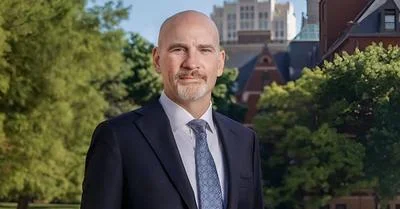Dr. Robert Popovian, Chief Science Policy Officer for the Global Healthy Living Foundation (left) and Carole Johnson, Administrator of the Health Resources and Services Administration | ghlf.org | HRSA.gov
Dr. Robert Popovian, Chief Science Policy Officer for the Global Healthy Living Foundation (left) and Carole Johnson, Administrator of the Health Resources and Services Administration | ghlf.org | HRSA.gov
The authors of a March report that details profits earned by Disproportionate Share Hospitals (DSHs) through the 340B Drug Pricing Program are calling for reform of the program after finding that up to 50 percent of these hospitals aren't investing savings earned through “significant discounts” on drugs into “charity care” for the low-income and uninsured patients that they serve.
According to the report by Alliance For Integrity & Reform (AIR340B), total drug purchases at the discounted 340B price were $54 billion in 2022, 87 percent of which were made by hospitals, with DHS hospitals accounting for $42 billion, or 78 percent of program sales.
However, despite these savings, the report found that many DHS hospitals aren't applying their profits toward financial assistance programs for the patients intended to benefit from the 340B program. Compounding the issue is that hospitals aren't required to report 340B profits or how they spend it.
“The 340B program was created to help low-income, uninsured and vulnerable patients access more affordable medications,” a spokesperson from the Alliance For Integrity & Reform (AIR340B), the organization that authored the report, shared in a statement with Show Me State Times. “It is concerning that 340B hospitals that serve low-income and uninsured patients, like DSHs, are receiving significant discounts through the 340B program and not investing those savings in charity care for vulnerable communities. With more than half of DSHs in Missouri earning more in estimated 340B profit than is spent on charity care, the need for 340B reform is clear.”
The report further explained that DSH hospitals do report the costs that they incur to provide free or reduced-cost health care to qualifying low-income and uninsured patients, also known as "charity care," and that funding this care is one way in which 340B profits could be used as Congress intended.
In that same sense, the report noted that while DSH hospitals earned an estimated $44.1 billion in 340B profit in 2022, those same hospitals reported $18.5 billion in charity care costs in their most recent fiscal year.
Though individual DSH hospitals are not required to report their 340B profit, AIR340B’s report explained it was possible “to allocate the estimated $44.1 billion in 340B profit across each DSH hospital that was enrolled in the 340B program in 2022, using patient revenue as a proxy for the relative size of each hospital’s 340B program.”
Using this framework, the report said about 85 percent of DSH hospitals earned more in 340B profit in 2022 than they incurred in charity care costs.
In Missouri, up to 50 percent of DSH hospitals qualify for this designation.
“The fact that charity care costs account for only 42 percent of DSH hospitals’ 340B profit, on average, implies that DSH hospitals primarily use 340B profit for other purposes, including funding payroll, equipment and other operating costs. Additionally, it should be noted that DSH hospitals benefit from tax-free status and receive other safety net funding to support their charity care activities. As the 340B program continues to grow and the lack of accountability becomes more pronounced, more questions may arise about whether covered entities are using their 340B profit to fulfill the original safety-net focus of the program.”
Dr. Robert Popovian, Chief Science Policy Officer for the Global Healthy Living Foundation, a group counting itself as a member of the alliance coordinated by AIR340B, provided additional insight.
Popovian cited research from The Pioneer Institute, which obtained its data from both the Health Resources and Services Administration (HRSA) and RAND Corporation, found that the national average of charity care measurement is 2.28%.
“Concerning Missouri, the average charitable contribution of 340B hospitals is 2.57%, which is slightly higher than the national average. Therefore, based on our data, I can see how a significant percentage of hospitals in MO, [have] profits [which] exceed charitable spending. You can find all our data, including methodology and data sources, on the Pioneer website, which is accessible to everyone at no cost,” Popovian said.
In an earlier story, Patients Come First’s Missouri Executive Director Connie Farrow said the 340B program “doesn’t seem to do the job” her organization had been hoping for.
Her sentiments were seconded by State Sen. Justin Brown (R-Rolla), the author of Senate Bill 751, who explained his legislation puts patients first, by ensuring better access to discounted prescription drugs in their local areas. The bill, which restricts 340B Drug Pricing Program contracts between Missouri hospitals, healthcare centers and local pharmacies, became Missouri law on Aug. 28.
“This program has been important to the financial viability of many of our rural providers. In the past decade, 10 [Missouri] hospitals have closed and many others have operated a loss. My legislation can mean the difference between whether or not a hospital stays open or closes,” Brown said to the Special Committee on Public Policy at a previous hearing.
“In 47 states and the District of Columbia, more than half of DSH hospitals earn more in estimated 340B profit than they spend on charity care. In 18 states and the District of Columbia, every DSH hospital earns more from 340B profit than it spends on charity care,” according to AIR340B's report.
“Federal lawmakers must take action to improve transparency, accountability and oversight in 340B to ensure the program is working towards its original goal—helping patients in need,” an AIR340B spokesperson said.





 Alerts Sign-up
Alerts Sign-up